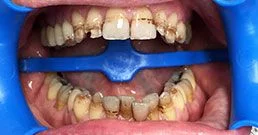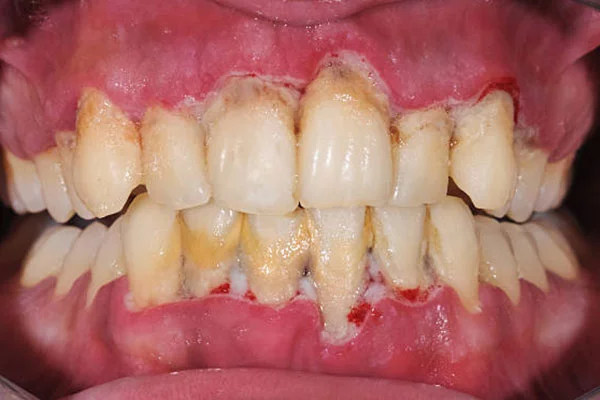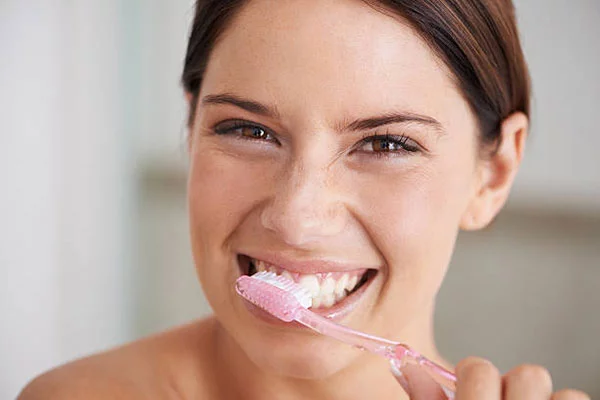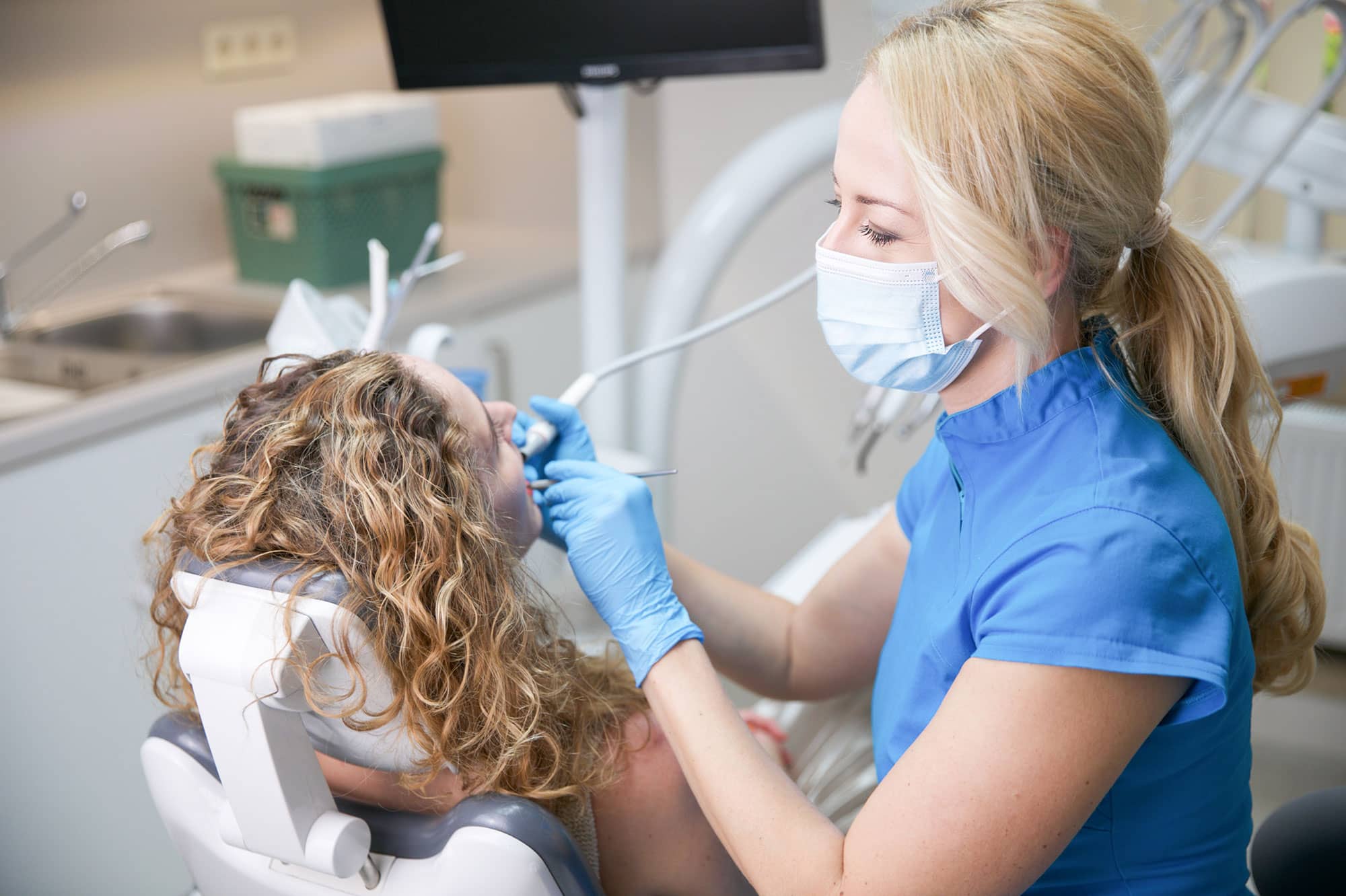Black stains on teeth pose a serious problem in life. Besides health risks, they can cause self-confidence problems, communication inhibitions and decreased self-esteem. Black teeth also give the impression of slovenliness.
To avoid these inconvenient consequences, it is important to be aware of the causes and treatments of black teeth. Most importantly, we must place great emphasis on prevention.
In this article you will get answers to the following questions about black teeth:

- What are the causes of teeth turning black?
- Black teeth caused by dental plaque
- Black teeth caused by tooth decay
- Black teeth caused by amalgam restorations
- Black teeth caused by tetracycline antibiotics used in childhood
- Black teeth caused by pulp necrosis
- What should I do to prevent my teeth turning black?
What are the causes of teeth turning black?
Black stains on the teeth may appear for several reasons.
Black teeth caused by dental plaque
Dental plaque appears as brown and black stains on the surface of the teeth. It is not only aesthetically troubling but also can lead to periodontal disease, tooth decay, gingivitis, pyorrhea and finally tooth loss.
Cause: Habitual smoking and the consumption of tea, coffee and dark-coloured soft drinks can lead to the discoloration of teeth. Neglected oral hygiene can favour the formation of plaque.
Treatment: The dentist performs scaling with an ultrasonic device to remove plaque and stains. After this he polishes the teeth to prevent the development of plaque in the future.
Prevention: Brush your teeth after every meal with a special toothpaste. Do not smoke and avoid drinking tea, coffee and dark-coloured soft drinks.
Black teeth caused by tooth decay
Tooth decay appears as greyish-black stains and holes, especially on the hard-to-clean areas of the teeth (for example in between the teeth or in the grooves of molars). It is caused by the lack of necessary minerals in teeth structure, due to which the teeth become thin and then break. If left untreated, the tooth decay will reach the nerves and cause inflammation and pain.
 Cause: When you consume carbohydrate, the bacteria depleting carbohydrate produce acid and plaque-forming material. The bacteria which produce the tooth enamel-eroding acid live in the plaque. Acid foods themselves damage the enamel. The more often you eat, the more plaque can develop, and the longer the food remains in your mouth, the greater damage it causes.
Cause: When you consume carbohydrate, the bacteria depleting carbohydrate produce acid and plaque-forming material. The bacteria which produce the tooth enamel-eroding acid live in the plaque. Acid foods themselves damage the enamel. The more often you eat, the more plaque can develop, and the longer the food remains in your mouth, the greater damage it causes.
Treatment: The dentist removes the decay and then puts in a filling. The most advanced technology for the treatment of tooth decay is ozone therapy. If the dentist cannot save your tooth due to excessive damage, he must extract it.
Prevention: Healthy eating is essential. You must especially avoid acidic, sticky foods, sweetened beverages and sweets. Do not eat snacks between meals! You can do a lot to prevent decay by brushing your teeth properly after every meal. If your teeth lack fluoride, you can use toothpaste enriched with fluoride and use salt with fluoride for flavouring dishes. This helps you to maintain white teeth colour. Be careful not to overdose the fluoride. A daily consumption of more than 5 mg of it softens the teeth enamel and turns teeth yellow. Fissure sealing carried out in childhood is a great method to reduce the risk of decay.
Black teeth caused by amalgam restorations
Amalgam restorations darken teeth to a grey-black colour.
Cause: The black discoloration is caused by the filling material containing silver-sulfide.
Treatment: Dentist can treat the discoloured teeth by covering it with a porcelain veneer or crown. It is very difficult to make this type of discoloration disappear by bleaching.
Prevention: Avoid amalgam restorations.
Black teeth caused by tetracycline antibiotics used in childhood
Teeth appear to be bluish-brownish-black on the surface.
Cause: Tetracycline antibiotics were given to the child during the development of teeth.
Treatment: By bleaching or applying laminate veneer.
Prevention: Do not give tetracyclin antibiotics to children under 8 years of age, unless absolutely necessary.
Black teeth caused by pulp necrosis
As a result of pulp necrosis, teeth may become greyish-black.
Cause: Untreated tooth decay or a tooth trauma can lead to pulpitis and then to pulp necrosis.
Treatment: Black teeth with pulp necrosis need root canal treatment first. Then the dentist can bleach them or apply a veneer or crown to restore the original colour of the teeth.
Prevention: It is essential to treat dental diseases or traumas as soon as possible.
What should I do in order prevent my teeth from turning black?
- You have to brush and floss your teeth after every meal in an appropriate manner as recommended by dentists, at least for 3 minutes.
- Have a healthy diet, do not snack between meals.
- Do not smoke and avoid excessive consumption of coffee and tea, carbohydrates, sweets, sweetened beverages and acidic foods.
- If your teeth need filling, do not chose amalgam restoration
- Do not give children tetracyclin antibiotics, unless absolutely necessary
- If you have any kind of dental problem, contact your dentist at once. Waiting will only make matters worse.
- Have regular dental check-ups.


